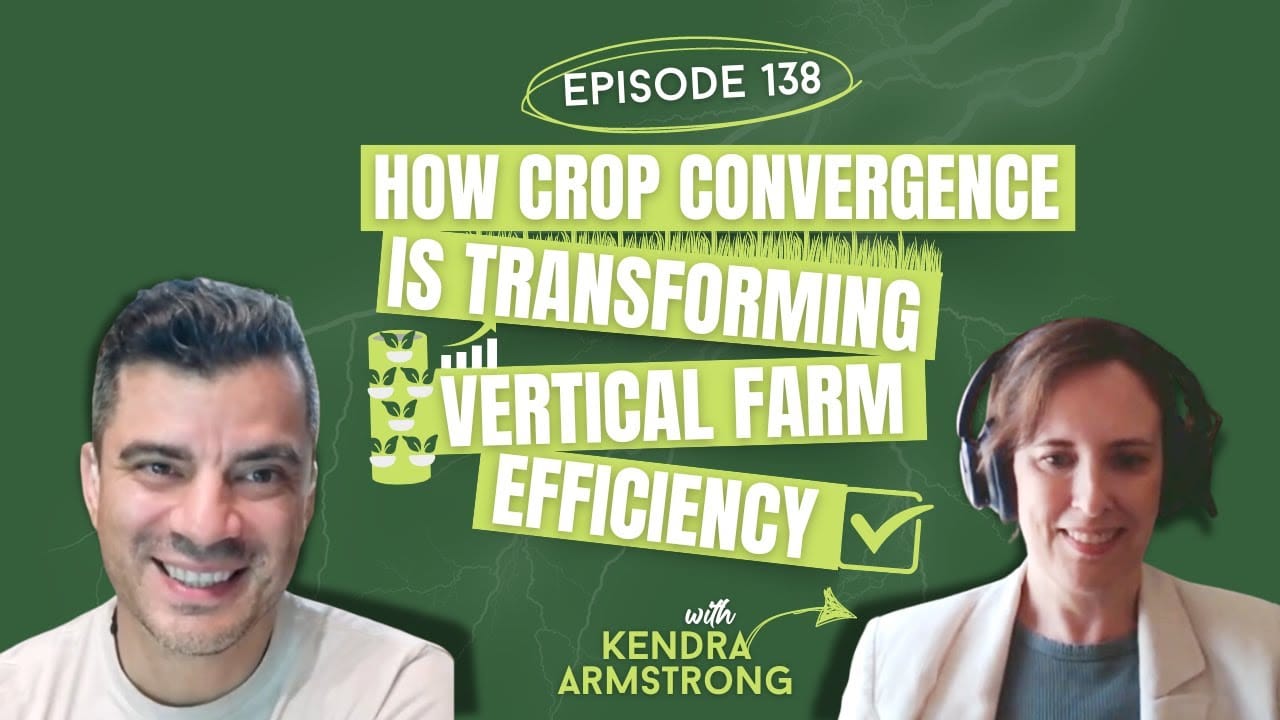Key Takeaways
- Kendra Armstrong’s background in plant breeding and computational modeling led to the founding of Crop Convergence.
- Crop Convergence develops decision-making tools to help farmers optimize efficiency, profitability, and resource management.
- The company works with farms that have at least one to two growth cycles of data, using digital twins to model plant interactions with specific farm environments.
- Armstrong emphasizes the importance of listening to farmers, ensuring technology provides real value rather than becoming another “shiny tool” with unfulfilled promises.
- She highlights the industry's shift toward treating vertical farms more like traditional farms, focusing on efficiency and sustainability.
Kendra Armstrong: From Farm Life to AgTech Entrepreneurship
Kendra Armstrong, Co-Founder and CEO of Crop Convergence, joined Harry Duran on the Vertical Farming Podcast to discuss her journey from growing up on a 150-acre farm in southern Indiana to leading a company that builds decision-making tools for farmers.
Armstrong grew up in a traditional farming family but realized early on that she did not want to take over the farm due to the stress and financial risks involved. Instead, she pursued a career in plant breeding and computational modeling, focusing on AI-driven agriculture tools. Over time, she transitioned from corporate roles into founding Crop Convergence, where she and her team help farmers analyze data and improve operational efficiency.
“I fell in love with the farm, but I knew I didn’t want to farm. Instead, I wanted to do something that helped farmers.” – Kendra Armstrong
Building Practical Tools for Farmers
Crop Convergence focuses on creating digital twins of farms—computer models that simulate plant-environment interactions. This approach allows farmers to make data-driven decisions about resource use, profitability, and efficiency.
Ideal Customers for Crop Convergence
Armstrong explained that their tools work best for:
- Farms with at least one to two growing cycles of data, including yield, sensor, and management data.
- Medium-to-large greenhouse or vertical farms producing at a scale where optimization matters.
- Farmers looking to maximize efficiency, whether by increasing profitability or reducing input costs.
“Our goal is to provide growers with as much quantified, straightforward information as possible, so they can make better decisions and even take a vacation without worrying about their farm.” – Kendra Armstrong
Challenges in AgTech and Industry Lessons
Navigating Tech Adoption in Agriculture
Armstrong acknowledges the skepticism farmers have toward new technology. Many farmers have experienced “tech burnout”, where new tools are introduced but fail to deliver meaningful improvements.
“Farmers have been promised so much by tech providers, and many feel like they’ve been let down. We want to ensure that our tools actually provide value.” – Kendra Armstrong
To address this, Crop Convergence prioritizes honest conversations with farmers, sometimes even advising them not to invest in their technology if another solution—like a better climate control system—would be more beneficial.
Shift Toward Treating Vertical Farms as Traditional Farms
Reflecting on the evolution of the indoor farming industry, Armstrong noted that many vertical farms are now operating more like traditional farms. This transition allows technology providers to develop tools that focus on efficiency and long-term sustainability rather than high-risk, venture-backed growth models.
“We’ve seen a shift—vertical farms are now thinking like farms, not tech companies. That’s a good thing because it means we can build tools that are truly useful for their operations.” – Kendra Armstrong
Growth Plans and Future Outlook
Looking ahead, Armstrong set realistic short-term goals for Crop Convergence:
- Expanding research into more specialty crops.
- Securing additional customers, aiming for five new farm partnerships in the next year.
- Strengthening industry collaborations, including work with Unu and Athenae.
- Continuing to bootstrap growth, focusing on sustainability and organic scaling.
“We’re running this like a traditional small business, making sure we’re building something sustainable rather than chasing rapid expansion.” – Kendra Armstrong
Final Message From Kendra Armstrong to Industry Peers
As a closing thought, Armstrong encouraged collaboration and active listening within the agtech industry. She believes that technology providers must engage with farmers, understand their challenges, and develop practical, farmer-centric solutions.
“Let’s keep fighting the good fight. We’re all here to grow food and make farming better—let’s stay focused on that mission.” – Kendra Armstrong


